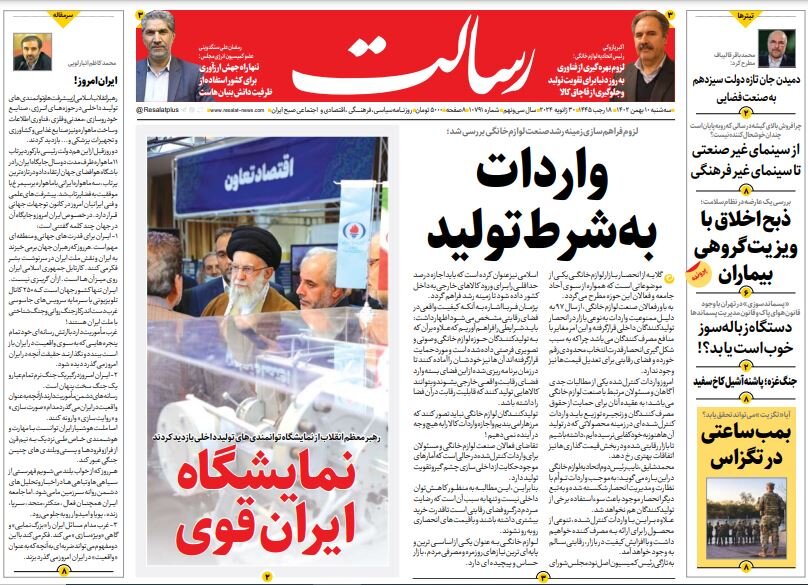TEHRAN PAPERS

TEHRAN - Resalat devoted its editorial to the successful launch of Iranian satellites and said: The successful launch of the Simorgh satellite carrier and the placement of three Iranian satellites in the earth's orbit may be more painful for the enemy than the firing of military missiles towards its positions, because both during the launch of Noor 3 satellite and the launch of Soraya satellite with Qaem 100 satellite, the United States and three European countries condemned Iran as a member of the JCPOA.
The excuse for this condemnation was that these actions were in line with the development of the missile industry, especially ballistic missiles. It is clear that this excuse is baseless and the point is to prevent Iran's scientific progress. The comprehensive strengthening of Iran as a country that can potentially be a world power is much more frightening for the enemy than if we directly enter into various regional conflicts. Despite the five unsuccessful attempts of the Simorgh satellite carrier in the past and the ridicule of the enemies after that, now Simorgh was able to launch three satellites simultaneously for the first time, and all previous failures got the color of victory.
Iran: Iran's warning to accusations of America
In a note, the Iran newspaper addressed the claim of Iran's involvement in the attack on the U.S. base in Syria and wrote: Biden, following the targeting of his country's military base near the Jordan-Syria border accused Iran; but at the same time, some high-ranking military and security officials of the United States denied Iran's role in these attacks. This was while the Islamic Republic rejected the claims made about its role in the attack on the American base in this region and called it a conspiracy and projection of those who see their interests in dragging the United States into a new battle in the region and provoking it into the expansion and intensification of the crisis. The American statesmen are raising conflicting positions regarding the role of the Islamic Republic of Iran in the crisis in the region that seems to be a sign of desperation in the Gaza war. Iran monitors developments in the region with readiness and vigilance, and the responsibility for the consequences of provocative accusations against Iran rests with the perpetrators of such baseless claims.
Shargh: American bluff or Washington's violence?
In an interview with Hossein Sanei, an expert on political issues, Shargh dealt with the possibility of the escalation of tension in the region after the death of 3 American soldiers. It wrote: The recent event has brought the developments in the Middle East into a new round of regional tension. Except that now the United States, by making false accusations against Iran, has pushed the atmosphere in a way that some media and political activists, especially in the United States, are talking about a direct attack on Iran. Despite this, many analysts, experts and observers believe that this claim is baseless; especially since both Tehran and Washington have denied any connection between this attack and Tehran's role. In this regard, John Kirby also stated that we are not looking for a war with Iran and we do not want to expand the scope of the conflict in the Middle East. According to Sanei, the possibility of war with Iran is very unlikely; because Tehran and Washington have the experience of controlling conflicts and not causing direct tension. When both sides have demonstrated the ability to prevent direct tension, there is now the potential to control conflict and prevent direct war.
Sobh-e-No: The Middle East will not be safe for you
Sobh-e-No dedicated its editorial to the insecurity of the region for the occupiers and said: Using repeated phrases of proxy forces supported by Iran does not help America anymore. The resistance front from Yemen to Syria, Palestine, Iraq and Lebanon is punishing the aggressors and occupiers in the front line, and all the Muslim nations of the region are and will be supporters of this legitimate and reasonable resistance. The Iranian revolution, which was the inspiration for the Muslim resistance groups in the Middle East, has achieved what it wanted today, and that is the will of the Muslim nations to stand against the occupying enemy. The field message for Western diplomacy is clear: the Middle East will never be safe for the occupiers and aggressors. The reality of the region today is that the Middle East considers the occupiers and colonial powers to be the cause of all its security problems in recent decades and welcomes their easy exit, but this knot will be untied in the hands of the resistance, and this is not only the will of the Islamic Republic of Iran and the nation of Iran but is also the desire of all Muslim nations of the Middle East.

No comments:
Post a Comment